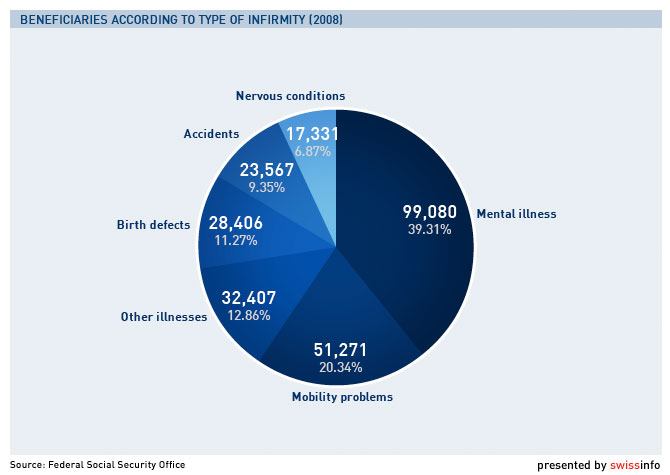
Voters approve short-term tax hike

The Swiss have narrowly voted in a temporary tax increase to prop up the debt-ridden disability insurance scheme.
In voting on Sunday, 54.5 per cent of the electorate and a majority of cantons came out in favour.
The government said a 0.4 percentage point rise in value added tax (VAT) to eight per cent was needed to help ease the strain on the state-run insurance.
Most parties supported the government position.
Opponents, including the rightwing Swiss People’s Party and two small rightwing groups, warned that raising taxes would slow private consumption and put an unfair financial burden on families.
They also said the extra funding would encourage insurance scams.
“There is fraud, there are unrestricted payments to Swiss expatriates and there are entire villages in former Yugoslavia that live at the expense of the disability insurance scheme,” said People’s Party parliamentarian Hans Fehr.
The federal authorities dismissed allegations of widespread fraud, saying the overall abuse rate is thought to be about one per cent.
Supporters of the tax increase argued that rejection of the proposal would jeopardise the country’s social security system, including the old age pension scheme.
“It is a matter of responsibility and solidarity,” said Silvia Schenker from a health umbrella group and parliamentarian of the centre-left Social Democrats.
Solidarity
Alongside the centre-right parties they warned that people in need will no longer be able to obtain the necessary financial assistance if voters reject the tax increase.
The government described the vote as crucial for the social security system and downplays the tax burden on consumers.
“It means only an extra four francs in taxes on every thousand francs,” said Interior Minister Pascal Couchepin.
The proposed fiscal hike is limited to seven years and aimed at balancing the insurance fund’s current annual deficits of about SFr1.4 million ($1.3 million). The scheme, which was set up in 1960 and is aimed at integrating disabled people into society, has run up debts of SFr13 billion.
More cases
Some 300,000 people presently receive benefits, amid an increase in cases of mental illness since the 1990s blamed on increased pressure at the workplace and problems related to immigration and poverty.
About 40,000 beneficiaries live outside Switzerland, mostly in European Union countries, according to official figures. Some 4,000 beneficiaries reside in countries of the former Yugoslavia and Turkey and have been targeted by the rightwing as potential fraudsters.
VAT in Switzerland is currently at 7.6 per cent, with reduced rates for the hotel industry and essential consumer goods.
Leading gfs.berne polling and research institute predicted a close outcome.
“Supporters have an advantage, but they have no definite majority,” said political scientist Claude Longchamp two weeks ahead of the vote.
Delays and little interest
He expected a below average turnout of about 34 per cent as the parties failed to mobilise voters. Public attention was focused on other issues, according to Longchamp, notably a diplomatic row with Libya and the election by parliament of a new cabinet minister.
The vote was initially set for May, but the government decided to postpone it amid concerns by the business community that the global economic downturn could undermine the chances of approval at the ballot box.
The government and parliament also put off the date for the implementation of the planned tax increase. It is now due to come into force in 2011 – 12 months later than foreseen originally – if approved by a majority of voters and cantons.
Small and medium-sized entreprises had complained that there was not enough time for them to adapt to the new fiscal regime by the beginning of next year.
Urs Geiser, swissinfo.ch
About five million citizens, including registered Swiss abroad were eligible to vote on Sunday.
Ballots also took place in most of the country’s 26 cantons, as well as on a local level, on a variety of issues, including harmonising the basic education system, smoking bans and tax breaks.
As a rule nationwide votes take place four times a year.
On Sunday Swiss voters also decided to scrap of the so-called general people’s initiative by a majority of 2 to 1.
It allowed parliament in principle to decide whether an initiative would result in a constitutional amendment – as is the case with a traditional people’s initiative – or a change in the law.
The special voting right was introduced only six years ago, but has never been applied since, apparently because it is incompatible with the Swiss parliamentary system.
The government and an overwhelming majority in parliament and all the main political parties recommended abolishing the special voting right.


In compliance with the JTI standards
More: SWI swissinfo.ch certified by the Journalism Trust Initiative
















![The four-metre-long painting "Sonntag der Bergbauern" [Sunday of the Mountain Farmers, 1923-24/26] had to be removed by a crane from the German Chancellery in Berlin for the exhibition in Bern.](https://www.swissinfo.ch/content/wp-content/uploads/sites/13/2025/12/01_Pressebild_KirchnerxKirchner.jpg?ver=cb688ed5)















You can find an overview of ongoing debates with our journalists here . Please join us!
If you want to start a conversation about a topic raised in this article or want to report factual errors, email us at english@swissinfo.ch.